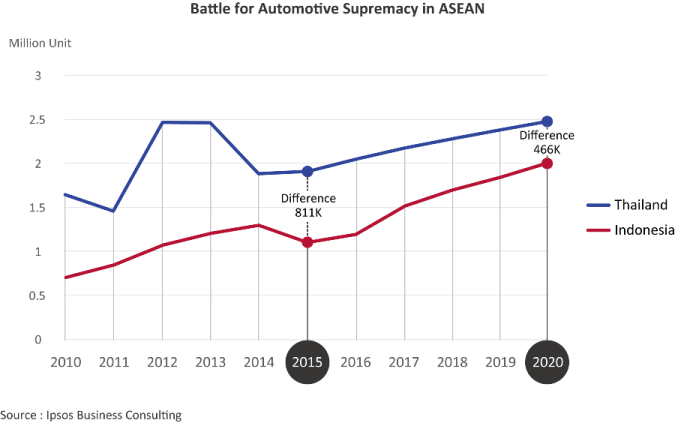Indonesia set to become main ASEAN automotive production hub, says report
 Car manufacturing in Indonesia is predicted to make up ground on Thailand up to 2020
Car manufacturing in Indonesia is predicted to make up ground on Thailand up to 2020
There is strong evidence Indonesia will eventually replace Thailand as the main automotive production hub in the Association of Southeast Asian Nations (ASEAN), according to Markus Scherer, global automotive sector leader at Ipsos Business Consulting. This could have major implications for automotive manufacturers and suppliers as well as policy planners in both countries, Scherer said.
“The evidence is clear that in terms of the trend in vehicle production output, policy development, and improvements in infrastructure, the Republic continues towards increasing capacity, domestic consumption and export volumes. Automotive manufacturers and policy makers in Indonesia, Thailand and elsewhere will want to consider the implications.”
Historically, Thailand has been the largest producer of automobiles in South East Asia with an annual production volume of around 2 million units as compared to Indonesia’s 1.1 million in 2015 . However, despite being the second largest automotive producer, Indonesia has not been as successful as Thailand at building its export markets, exporting only 23 per cent of its domestic production in 2015 compared to Thailand’s 55 per cent.
In 2015, the production gap between the two countries was around 810,000 units but, by 2020, the difference is forecasted to be 465,000. In its latest report “Indonesia Automotive Outlook 2020”, Ipsos Business Consulting finds that this gap can be closed through a combination of increased plant utilisation and domestic sales growth.
Indonesia had an installed production capacity of close to 2 million vehicles in 2015, but was only utilising around 62 per cent of this capacity; and further investment of up to USD 2.6 billion in the creation of new or expanded plant capacity, if utilisation rate remains the same. Even in the absence of significant export success at present, Indonesia has huge domestic growth potential, ensuring that investors can reliably expect a solid baseline in sales growth if they are appropriately positioned in the market.
Douglas Cassidy, Indonesia country head at Ipsos Business Consulting commented: “Global automotive players who do not yet have a significant production base in Indonesia will increasingly be asking whether they are positioned to gain market share in an ASEAN market comprising more than 600 million people, and whether they can defend their existing market share as other companies look to expand in Indonesia and Asia generally. A production base in Indonesia will enable them to benefit from the cost, scale and supply chain advantages of the country that seems on track to become the pre-eminent automotive power in ASEAN.”
Chukiat Wongtaveerat, senior consulting manager at Ipsos Bangkok echoed Cassidy’s analysis of the current situation, countering that Thailand can still protect its automotive industry, but any hesitation could prove disastrous. Wongtaveerat notes that several high profile automotive Original equipment manufacturers (OEMs) have announced exit strategies for the Indonesia market, most notably Ford Motor Company and General Motors. He said that other well-known players, such as Volkswagen, Hyundai and Mazda were not yet able to communicate a clear strategy for securing a strong and profitable market share that encompassed both of these emerging markets in South East Asia:
“Specifically in relation to Indonesia, it is going to require stable regulation and continuous development of the automotive supporting infrastructure against the backdrop of current sales. Once this happens, we are likely to see a “domino-effect”, with other absent OEMs looking to build a plant and engage in an aggressive expansion of their dealer networks,” said Wongtaveerat.
Difficulties persist in Indonesia’s business climate, however. According to the World Bank’s ‘ease of doing business’ index, Indonesia ranks 109 out of 198 countries, while Thailand ranks 49. The government in Jakarta aims to improve the country’s ranking to 40 by 2018. Such significant improvement, if it is to be achieved, will clearly require sustained focus from policymakers. Scherer notes that “Recent developments have been encouraging, encompassing the relaxation of foreign ownership rules and streamlined licensing application procedures.”
The Ipsos report on the Indonesia automotive market is available for download from the Ipsos Consulting website.


Comments